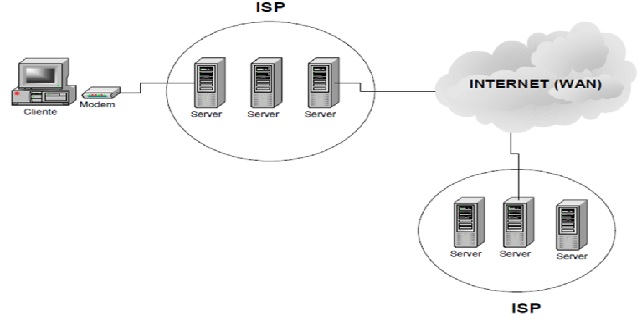ISP | Internet Service Provider | Internet Fundamentals
Internet Service Provider (ISP)
An Internet service provider (ISP) is a company that provides Internet connection to its customers. Connection to the user is provided via dial-up, ISDN, DSL, cable modem, wireless, T1/T3 lines or fiber. Customers are generally billed a fixed rate per month. An Internet service provider is also known as an Internet Access Provider (IAP).
Typically, ISPs also provide their customers with the ability to communicate with one another by providing Internet email accounts, usually with numerous email addresses at the customer’s discretion. Other services, such as telephone and television services, may be provided as well.

The Internet is an interconnected global network. The network can carry three types of information: data, video, and voice. To obtain access to the Internet, users (i.e., customers) connect to an ISP. For a monthly fee, ISP usually provides a software installation package, username, password and phone number. Using modem, we can log on to the Internet and browse the World Wide Web and send and receive e-mail.
In addition to serving individuals, ISPs also serve large companies, providing a direct connection from the company’s networks to the Internet.
Dial-up Internet access is the slowest type of Internet connectivity offered by ISPs. Cable, DSL and satellite Internet access typically provide much greater speeds than dial-up. Depending on the customer’s geographical location, the types of access offered by Internet Service Providers may be limited. Rural areas have access to dial-up connections only. Geographically disadvantaged areas like desert, hills and forest use satellite communications for Internet access. Note that installation of wires is difficult in such locations.
Government owned ISPs in India
- BSNL
- MTNL(serving Mumbai and Delhi)
Some privately owned ISPs in India
- Airtel
- Vodafone
- Tata DoCoMo
- Aircel
- Idea cellular
- Reliance Communications
- Tata Indicom
Types of ISPs
There were 3 types of ISPs: dial-up, broadband (high-speed) and DSL (Digital Subscriber Line) offered by phone companies. Today, dial-up services are rare, because they are very slow.
Next generation Internet is using fiber optics. Fiber is hundreds of times FASTER than cable or DSL.